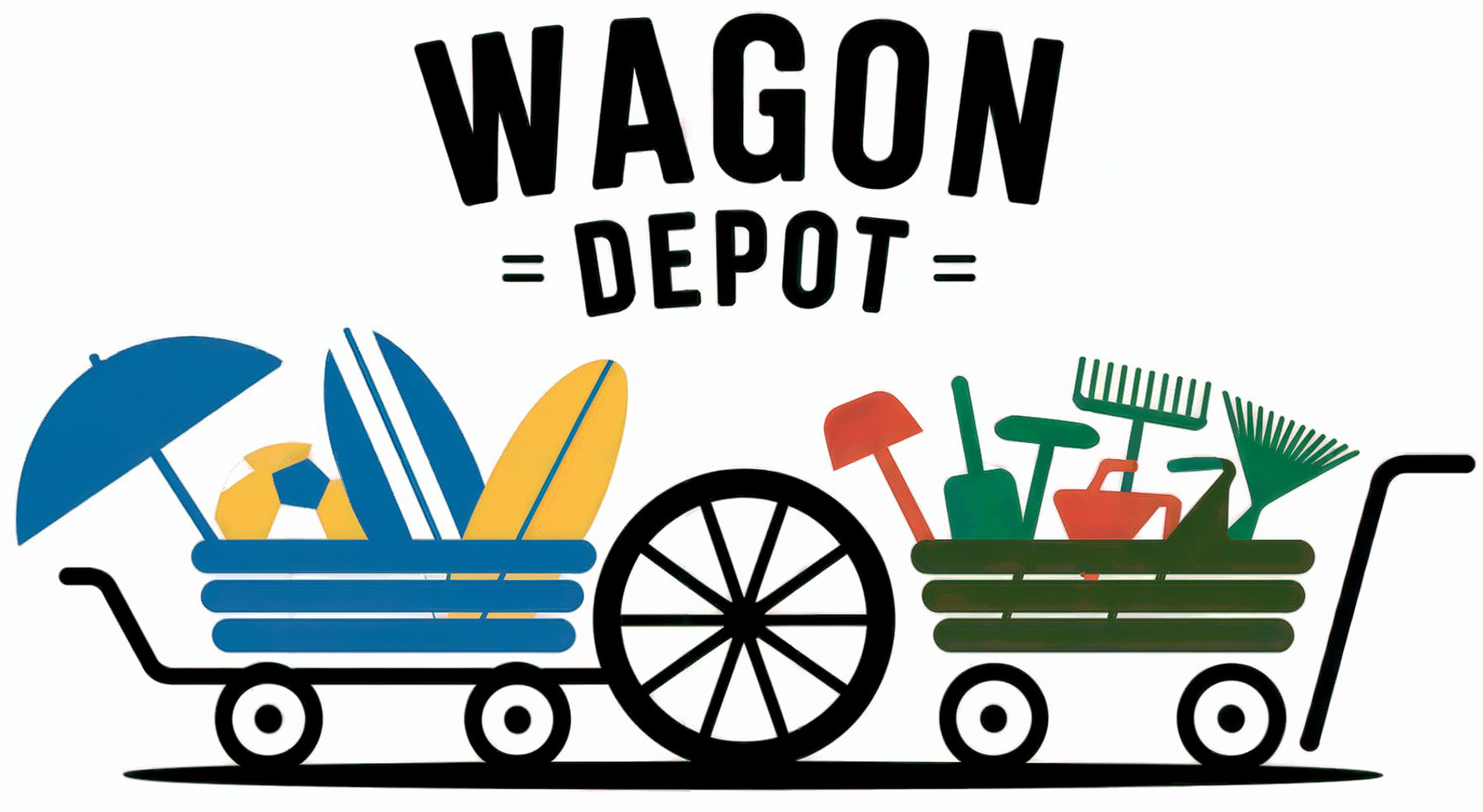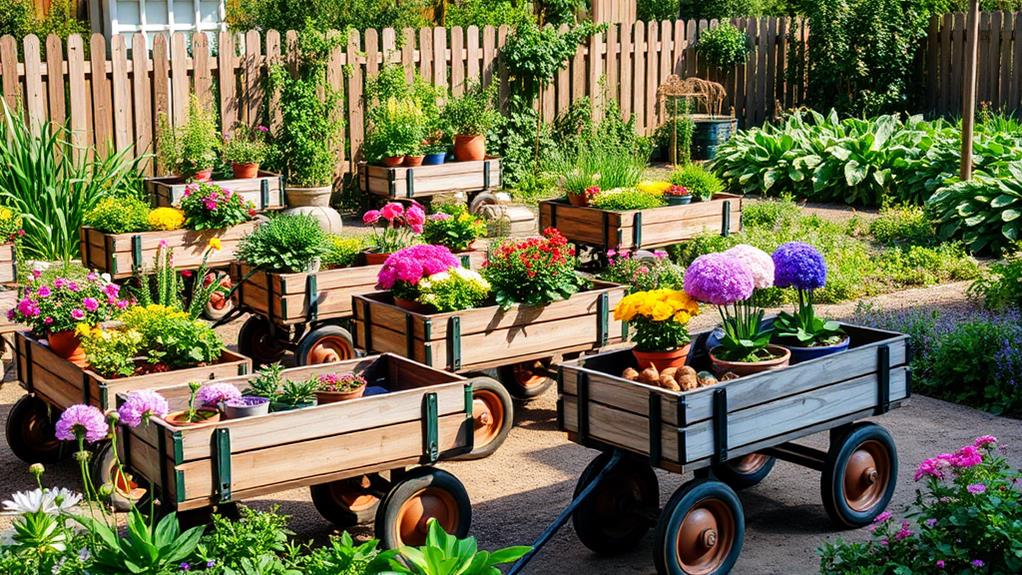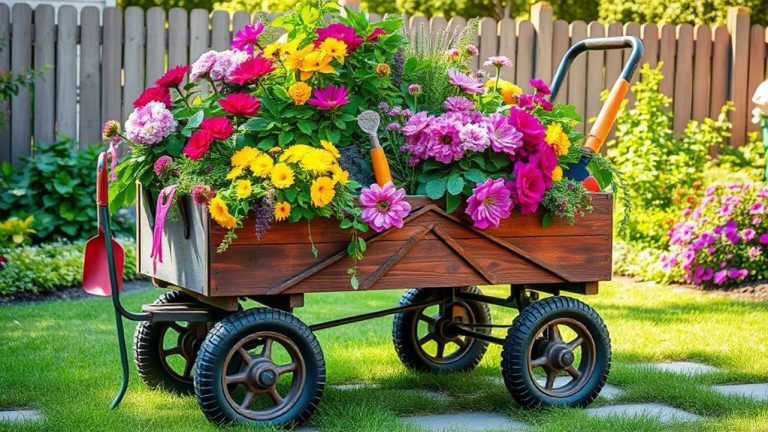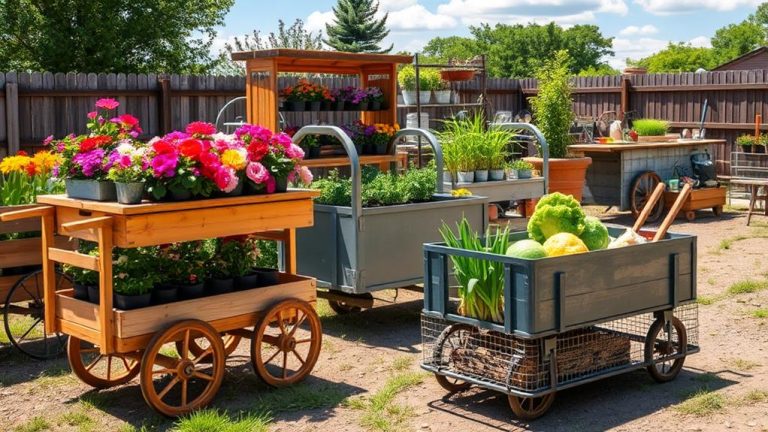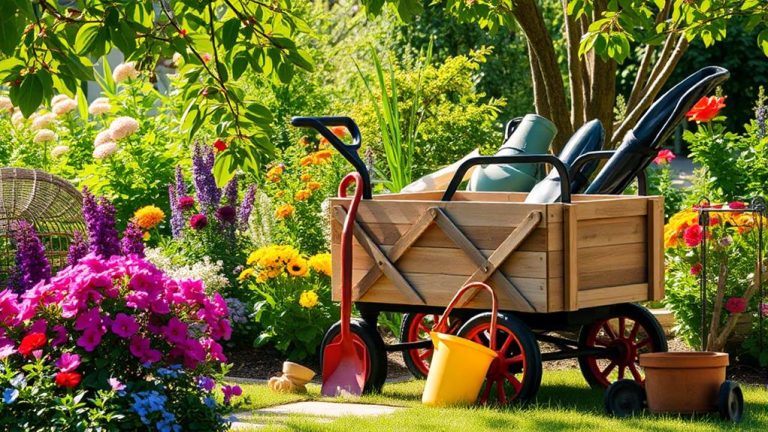In terms of moving plants, choosing a sturdy garden wagon is key. A Gorilla Carts Heavy-Duty model offers great stability and a wide wheelbase, which is perfect for larger loads. Look for wagons with ergonomic handles for easier maneuverability, and consider wheels that are durable enough to navigate uneven terrain. Opt for a design that can support your typical capacity needs whilst facilitating an even weight distribution. You might also want to explore foldable options for easy storage. If you're curious about additional tips and recommendations for your gardening needs, there's more to uncover.
Types of Garden Wagons
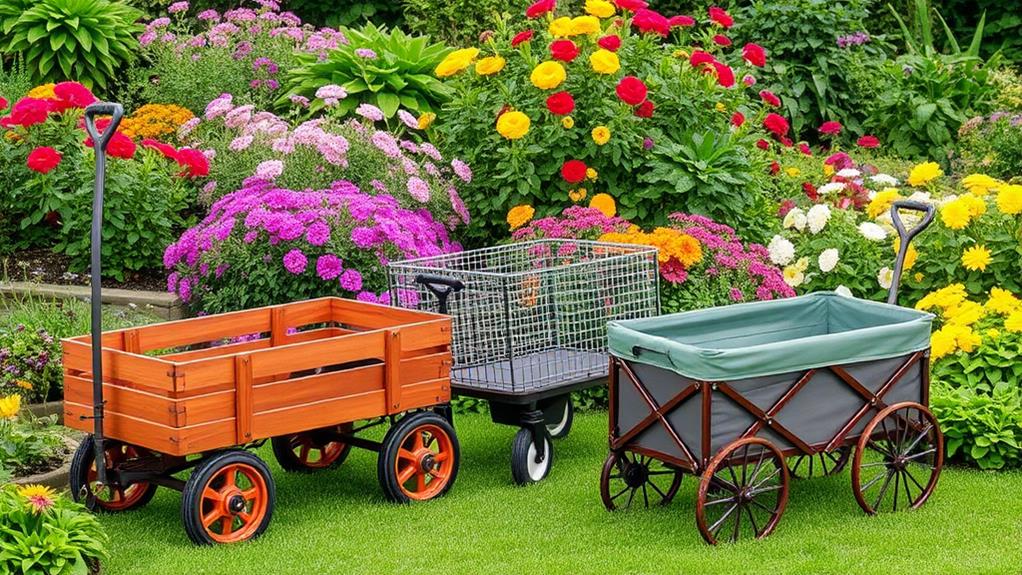
In regard to selecting the best garden wagon for moving plants, grasping the various types available can make a significant difference in your gardening experience. You'll find several garden wagon styles customized for different needs. For instance, a traditional flatbed wagon offers a sturdy platform for transporting larger plants and soil bags, whereas a folding wagon is perfect for those who value portability and compact storage.
If you're looking for versatility, consider a garden cart with removable sides; it can easily adapt to different loads, making it ideal for various gardening tasks. Some wagons furthermore feature all-terrain wheels, perfect for traversing uneven garden paths.
Don't forget about garden wagon accessories, which can improve your wagon's functionality. Items like tool holders, storage bags, and even canopies can make your gardening tasks more efficient. By grasping these different styles and accessories, you can choose a garden wagon that truly meets your needs, allowing you the freedom to focus on creating the garden of your dreams without the hassle of moving heavy items.
Key Features to Consider
When choosing a garden wagon for moving plants, several key features can greatly improve your gardening experience. You'll want to focus on aspects like ergonomic design and wheel stability to guarantee ease of use and safety during the transportation of your plants.
Here's a quick reference table to help you understand what to look for:
| Feature | Importance |
|---|---|
| Ergonomic Design | Reduces strain on your back and arms |
| Wheel Stability | Guarantees smooth transport over uneven terrain |
| Weight Capacity | Supports larger plants without risk |
An ergonomic design allows you to maneuver the wagon comfortably, minimizing fatigue during those long gardening sessions. Look for handles that fit your grip and height, making it easier to push or pull. Wheel stability is vital too; having durable, well-constructed wheels will provide the traction needed on various surfaces, from grass to gravel.
Best Materials for Durability
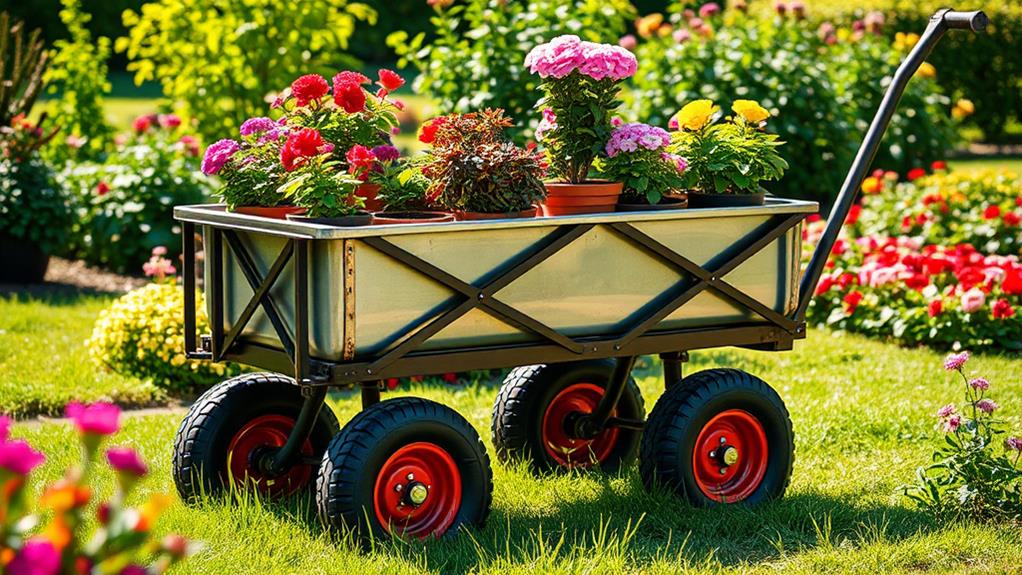
When choosing a garden wagon, the material plays a vital role in its durability. Metal options often offer sturdiness and resistance to wear, whereas wooden wagons can provide a more natural aesthetic but may require additional care. It's likewise fundamental to take into account weather-resistant materials to guarantee your wagon withstands the elements and lasts for years to come.
Metal vs. Wood Options
Choosing between metal and wood for your garden wagon can greatly impact its durability and performance. Each material has its unique benefits, and comprehending these can help you make the right choice for your gardening needs.
Here are four key points to reflect on:
- Metal Advantages: Metal wagons, typically made of steel or aluminum, offer exceptional strength and longevity. They resist wear and tear, making them perfect for heavy loads and rugged terrain.
- Weight: Although metal is sturdy, it can be heavier than wood. If you prefer a lightweight option for easy maneuvering, reflect on the weight of the material before purchasing.
- Wood Aesthetics: Wooden wagons provide a rustic charm that many gardeners appreciate. They blend beautifully with garden settings and can be customized with paint or stains to match your style.
- Maintenance: Metal may require minimal maintenance, whereas wood can need periodic treatment to prevent rot or pests. Contemplate how much time you're willing to invest in upkeep.
Weather-Resistant Materials Importance
Considering the different materials for your garden wagon, it's important to recognize how weather resistance plays a significant role in durability and performance. When you're moving plants, your wagon needs to withstand various elements like rain, sun, and temperature fluctuations. Choosing the right material can make all the difference.
For instance, metal wagons often provide excellent weather resistance when coated with rust-resistant finishes. Aluminum is lightweight yet durable, making it a popular choice. Conversely, wood can be beautiful and strong, but it typically requires more maintenance to guarantee durability against moisture and pests. If you opt for wood, look for treated options that improve weather resistance.
Plastic wagons can likewise be a great choice, as they're typically lightweight and resistant to rot and corrosion. Nevertheless, confirm that the plastic is UV-stabilized to prevent degradation from sunlight over time.
Ultimately, your material selection should align with your gardening needs and local climate conditions. A well-chosen garden wagon not only enhances your gardening experience but additionally offers the freedom to transport your plants without worry. So, take the time to evaluate your options wisely!
Size and Capacity Options
Finding the right size and capacity for your garden wagon is vital for efficiently moving plants and supplies. You want a wagon that meets your needs without compromising maneuverability. Consider these key aspects to guarantee you make a wise choice:
- Capacity: Determine how much you typically carry. A wagon with a larger capacity might be tempting, but if it's too big for your needs, it'll be harder to handle.
- Wheel Size: Larger wheels can traverse rough terrain more easily, giving you the freedom to navigate your garden without hassle. Smaller wheels may work on flat surfaces but limit versatility.
- Weight Distribution: Verify the wagon can support the weight you plan to haul. A well-designed wagon will distribute weight evenly, preventing tipping and making your trip smoother.
- Foldability: If space is a concern, consider a foldable design. This allows you to store it easily when it's not in use, giving you more freedom in your garden space.
Top Garden Wagon Recommendations
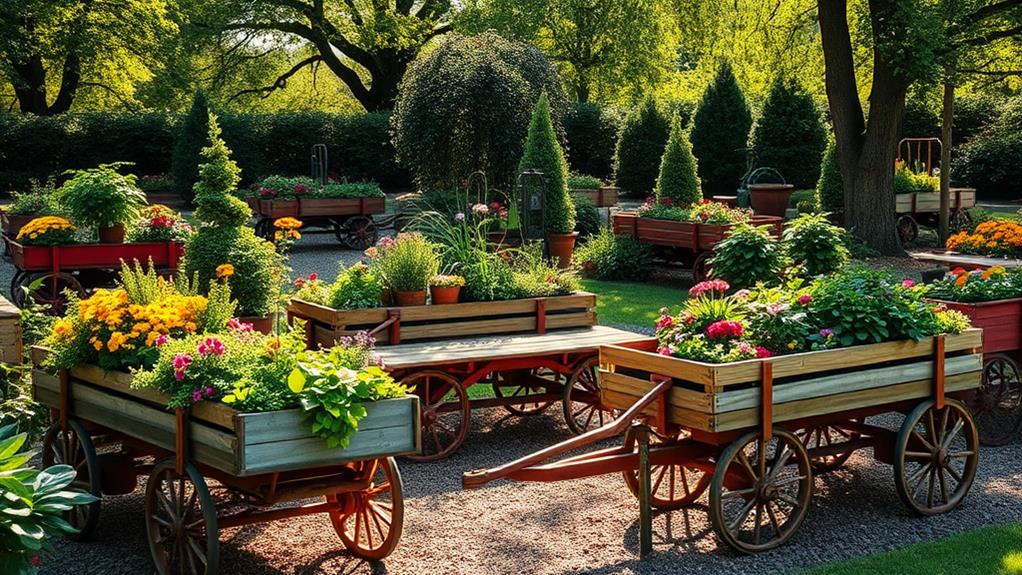
Regarding selecting the best garden wagon for moving plants, several standout options cater to different needs and preferences. If you're after versatility, consider a foldable garden wagon. It's lightweight, easy to store, and often comes with various garden wagon accessories like cup holders and removable liners, making your gardening tasks more enjoyable.
For those who prioritize comfort, look for wagons with an ergonomic design. These models feature adjustable handles and padded grips that reduce strain on your back and arms, allowing you to transport plants with ease. The Gorilla Carts Heavy-Duty Garden Cart is a great example, offering a sturdy build and a wide wheelbase for stability.
If you need a larger capacity, the Mac Sports Collapsible Folding Garden Cart is a solid choice. It can handle heavy loads while remaining easy to maneuver. Plus, its collapsible feature means you can tuck it away when not in use.
Ultimately, the best garden wagon for you depends on your specific needs—whether it’s capacity, ease of transport, or added accessories. Choose wisely, and let your gardening adventures flourish! A sturdy and reliable wagon can make all the difference in tackling outdoor tasks efficiently. If you need to haul heavy logs, the best utility wagon for firewood should have a durable frame and rugged wheels for easy maneuverability. Investing in the right wagon ensures that your yard work remains hassle-free and enjoyable.
Maintenance Tips for Longevity
To guarantee your garden wagon serves you well for years to come, regular maintenance is key. By incorporating a few simple practices into your routine, you can guarantee its longevity and performance. Here are some vital maintenance tips:
- Regular Cleaning: Use appropriate cleaning techniques to remove dirt, mud, and plant residues after each use. A damp cloth or sponge can work wonders, whereas a soft brush can help dislodge stubborn debris.
- Inspect Wheels: Wheel maintenance is vital. Regularly check for wear and tear. Confirm the wheels are free from dirt and pebbles that could hinder movement.
- Lubricate Moving Parts: Apply lubricant to wheel axles and any moving parts. This helps prevent rust and confirms smooth operation.
- Store Properly: When not in use, store your wagon in a dry place, ideally covered. This protects it from weather elements that could cause rust or fading.
Frequently Asked Questions
Can I Use a Garden Wagon for Hauling Other Items Besides Plants?
Absolutely, you can use a garden wagon for hauling various items beyond plants! Think about alternative uses like transporting tools, yard debris, or even kids' toys. Just keep in mind material considerations; some wagons are sturdier than others. If you're hauling heavier items, make sure your wagon's built to handle the load. With a bit of creativity, your garden wagon can become a versatile tool for all sorts of tasks around your home!
How Much Weight Can a Typical Garden Wagon Hold?
When considering how much weight a typical garden wagon can hold, it often depends on its design and material durability. Most garden wagons have a weight capacity ranging from 150 to 1,000 pounds. Wagons made from sturdy steel frames usually support heavier loads compared to those made of lighter materials. Always check the manufacturer's specifications to ascertain you're within the limits, allowing you to transport your items safely and efficiently.
Are Garden Wagons Suitable for Uneven Terrain?
You might wonder if a garden wagon can handle the bumps and dips of uneven terrain. Well, it depends on its features. Look for a wagon with large, all-terrain wheels and a sturdy frame for better maneuverability. Some models even include adjustable handles for easier navigation. With the right garden wagon, terrain adaptability becomes a breeze, letting you transport your gear wherever you need without the worry of getting stuck or tipping over.
What Is the Average Price Range for a Good Garden Wagon?
The average price range for a good garden wagon typically falls between $100 to $300. When considering your purchase, think about durability factors such as material quality and construction. Furthermore, the wheel types can greatly affect performance, especially on uneven terrain. Opt for larger, all-terrain wheels if you need versatility. Investing in a reliable wagon can make your gardening tasks easier, giving you the freedom to enjoy your outdoor space.
Do Garden Wagons Come With Warranties or Guarantees?
Yes, many garden wagons do come with warranty coverage, which can vary considerably by brand and model. Typically, you'll find warranties ranging from one to five years, often depending on the product lifespan. This warranty can provide peace of mind, guaranteeing your investment is protected against defects or issues. When choosing a wagon, check the warranty details to confirm it meets your needs and offers the support you might require down the line.
